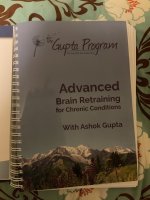Yeah, something like that! In a lot of the programs you're encouraged to do an hour total of their core limbic system downregulation exercise daily, so you could shoot for a total of an hour if you wanted to. It can for sure be broken up into smaller amounts, and you could work up gradually as you (hopefully!) recover more abilities.
I liked to do 30 mins as soon as I woke up, and 30 mins before dinner. Getting a big chunk done in the morning meant I knew it wouldn't get edged out by other things, and I found it hard to practice after dinner when my motivation was lower (from being tired). I would set an alarm for the before dinner part, so I wouldn't forget.
So think starting with the ten minute increments would be great! As long as that's within your capacity healthwise. the other aspects, like the happy bubble and self care, and avoiding stress, would be 24/7 (within reason!!) And you want to *very gently* course correct when you find yourself coming out of the happy/relaxed state. Soo...
* notice when you have down parts of your day--if something happens or some thought upsets you. Do a little more regulating then (tapping, havening, etc), like self care top up! Just do that for a few minutes and then move on with your day. It's okay if you don't feel much/any better (emotionally or physically), that will happen over time as your brain changes. The important part is that you interrupted your brain's reaction to those things, so you're giving it the *consistent* signal that everything is okay and it can drop back down into rest, digest, and heal.
* fill your time with relaxing/enjoyable activities as much as possible. Think about what makes you feel good, and schedule that in! For example, sometimes as soon as I get up in the morning I do a web search for fun, funny, or just "feel good" movies, then I watch one right after lunch. If I didn't do the research in the morning, I would be as likely to follow through. So plan for the things that will lift your mood.
I have also found it super helpful to just develop an attitude of self care towards myself, like encourage myself (out loud! lol) when something is difficult. Something I still do is when I'm doing something hard is I tell myself "good job, Koli! Almost done!" Even if I'm not almost done.

Because for *me* that feels encouraging. Another person might feel like that comes off false or insincere, and then they could experiment and do whatever they find helpful.

here are some more quick regulation techniques I learned about recently, which would be good for the course correcting:
* stamp your feet on the floor, saying which foot as you do it "left, right, left, right." (Or on your mattress, or whatever--the important part is that you are switching sides of your body. You could instead pat your hips on alternating sides with your arms at your sides in bed, "left right left right")
* take ten deep breaths, focusing especially on the exhale
* press your tongue to the back of your front teeth pretty hard (I prefer the place right behind them, like when you say "duh")
* sit down and feel the weight of your butt in the chair (I lie down and still focus on the weigh of my butt)
* eat protein--if you're craving carbs and sugar, just mix protein in with that. Protein is another calming signal for the brain.
* wash your hands and feel the water and soap on your hands (calming warm water)
* get a tight hug if you can. If not, back into a corner so the wall is "hugging" you, and then wrap your arms around the front of you to complete the hug. The idea is to feel pressure all around your torso, which calms the nervous system, so this could be done any way! Wrap your covers tight enough that you can feel them.

And here are some I suggested to a friend who is really struggling with depression right now (so, they are short and very low effort). It's things he likes. Alphastim is a tVNS (vagus nerve stimulation device). They are expensive, but if you already have one or could borrow one, they can also be great nervous system regulation tools. (El is his beloved and adorable niece! Maybe you have someone whose picture would make you smile?)
* use alphastim for very short time like 30 secs, or just put on the clips and don't turn it on. Some kind of baby step

* set a timer and look out the window for 2 minutes (I have been doing this in the morning! It's nice)
* start watching a blooper video, timed if you want
* watch 5 minutes Mr Bean
* drink some tea and notice how it smells and the warmth of cup in your hands
* look at pics of El for one minute
* notice one sensation in your body that is not pain (mindfulness)
I just want to repeat that at first it will likely seem like this isn't doing anything. That is 100% normal--this process takes time, so keep track of what you're doing as your "early wins"! It is a huge win just to be making any headway at all in *implementing* a system!!
I kept extensive notes every day, just celebrating every time I did my practice, or caught an unpleasant thought and did something about it! Lifestyle change is a lot of effort, so just spending some time making a plan (like reading this, taking notes on what might work for you) is a huge achievement worth celebrating!! Like I said before, i recommend making a plan for how you will encourage yourself and keep up your practice, because it's really key to be persistent, and that can be hard when you're exhausted and sick. But you can do it!





